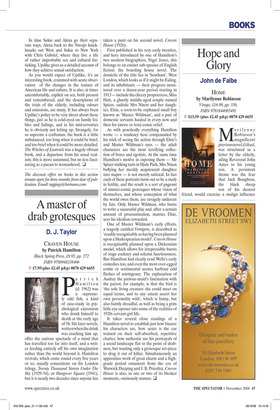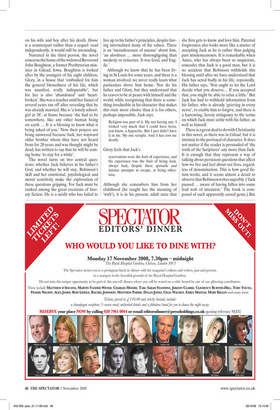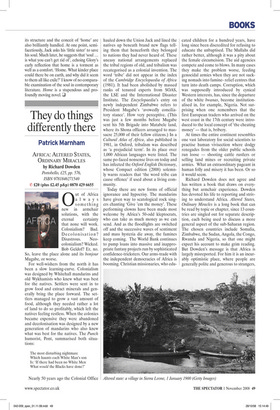Hope and Glory
John de Falbe
HOME by Marilynne Robinson Virago, £16.99, pp. 336, ISBN 9781844085491 V £13.59 (plus £2.45 p&p) 0870 429 6655 Ma r i l y n n e Robinson’s magnificent previous novel, Gilead, was structured as a letter by the elderly, ailing Reverend John Ames to his young son. A persistent theme was the fear that Jack Boughton, the black sheep son of his dearest friend, would exercise a malign influence on his wife and boy after his death. Home is a counterpart rather than a sequel: read independently, it would still be astounding.
Narrated in the third person, the novel concerns the home of the widowed Reverend John Boughton, a former Presbyterian minister in Gilead, Iowa. Boughton is looked after by the youngest of his eight children, Glory, in a house that ‘embodied for him the general blessedness of his life, which was manifest, really indisputable’, but for her is also ‘abandoned’ and ‘heartbroken’. She was a teacher until her fiancé of several years ran off after revealing that he was already married. She is ‘a lonely schoolgirl at 38’, at home because ‘she had to be somewhere, like any other human being on earth ... It is a blessing to know what is being asked of you.’ Now their prayers are being answered because Jack, her wayward older brother whom they have not heard from for 20 years and was thought might be dead, has written to say that he will be coming home ‘to stay for a while’.
The novel turns on two central questions: whether Jack believes in his father’s God, and whether he will stay. Robinson’s skill and her emotional, psychological and moral sensitivity make the exploration of these questions gripping. For Jack must be ranked among the great creations of literary fiction. He is a misfit who has failed to live up to his father’s principles, despite having internalised many of his values. There is an ‘incandescence of unease’ about him, ‘an aloofness ... more thoroughgoing than modesty or reticence. It was feral, and fragile.’ Although we know that he has been living in St Louis for some years, and there is a woman involved, we never really learn what particulars drove him home. Nor do his father and Glory, but they understand that he craves to be at peace with himself and the world, while recognising that there is something irreducible in his character that makes this state more elusive than it is for others, perhaps impossible. Jack says:
Religion was part of it. My not having any. I wished very much that I could have been, you know, a hypocrite. But I just didn’t have it in me. My one scruple. And it has cost me dearly.
Glory feels that Jack’s
reservations were the fruit of experience, and his experience was the fruit of being Jack, always Jack, despite these sporadic and intense attempts at escape, at being otherwise.
Although she remembers him from her childhood (he taught her the meaning of ‘waft’), it is in his present, adult state that she first gets to know and love him. Paternal forgiveness also looks more like a matter of accepting Jack as he is rather than judging past misdemeanours. It is remarkable when Ames, who has always been so suspicious, concedes that Jack is a good man, but it is no accident that Robinson withholds this blessing until after we have understood that Jack has acted badly in his life, repeatedly. His father says, ‘You ought to let the Lord decide what you deserve... If you accepted that, you might be able to relax a little.’ But Jack has had to withhold information from his father, who is already ‘grieving in every nerve’, to enable him to forgive, and there is a harrowing, heroic stringency to the terms on which Jack must settle with his father, as well as himself.
There is a great deal to do with Christianity in this novel, as there was in Gilead, but it is intrinsic to the portrayal of character. It does not matter if the reader is persuaded of ‘the truth of the Scriptures’ any more than Jack. It is enough that they represent a way of talking about persistent questions that affect how we live and feel about our lives, regardless of denomination. This is how good fiction works, and it seems almost a detail to observe that Robinson writes superbly. (‘Jack paused ... aware of having fallen into some frail web of intention.’ The book is composed of such apparently casual gems.) But its structure and the conceit of ‘home’ are also brilliantly handled. At one point, semifacetiously, Jack asks his ‘little sister’ to save his soul. Much later, he suggests that ‘soul ... is what you can’t get rid of’, echoing Glory’s early reflection that home is a torment as well as a comfort. ‘Home. What kinder place could there be on earth, and why did it seem to them all like exile?’ I know of no comparable examination of the soul in contemporary literature. Home is a stupendous and profoundly moving novel. q




































































































 Previous page
Previous page